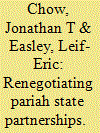| Srl | Item |
| 1 |
ID:
089980


|
|
|
|
|
| Publication |
2009.
|
| Summary/Abstract |
China's non-intervention policy has long been criticized for prolonging the rule of many authoritarian regimes. Myanmar has become one of the classic examples. As China is expected to become a responsible great power, her behavioral patterns have aroused many concerns. This paper aims to re-interpret China's non-intervention policy. While explaining various constraints on China's capability to intervene in the Myanmar government, it shows how China is making efforts to seek a new intervention policy in dealing with countries like Myanmar. It argues that China's insistence on a non-intervention policy does not mean that China does not want to influence other countries such as Myanmar. To assess Chinese leverage and its non-intervention policy toward Myanmar as well as to supplement the current limited academic discussion on Sino-Myanmar relations, in this paper we first examine Chinese leverage in Myanmar through Burmese local politics, such as the power struggle between the central government and local rebel governments. Second, we disaggregate the Chinese interests in Myanmar into different levels (regional, geo-strategic and international) and discuss how these interests affect China's non-intervention policy. Third, we argue that China has indeed tried to intervene in Myanmar politics, but in a softer manner that contrasts with the traditional Western hard interventions, such as economic sanctions and military interference.
|
|
|
|
|
|
|
|
|
|
|
|
|
|
|
|
| 2 |
ID:
168441


|
|
|
|
|
| Summary/Abstract |
Pariah status for violating international norms over decades increased Myanmar and North Korea’s dependence on China. Myanmar’s post-2010 reforms sought to reduce international sanctions and diversify diplomatic relations. North Korea pursued a diplomatic offensive after the 2018 Winter Olympics, but only after declaring itself a nuclear state. Why, despite both states’ politically unsustainable dependence on China, did Myanmar and North Korea pursue different strategies for renegotiating reliance? Unlike the Kim regime, Myanmar’s junta could step back from power while protecting its interests. Pro-democracy leader Aung San Suu Kyi was a credible signaler of reforms, providing Western governments political cover to reduce sanctions. Myanmar used liberalizing reforms to address internal threats, whereas North Korea utilizes external threats for regime legitimacy. The theoretical underpinnings and empirical trajectories of these distinctions–as well as Myanmar’s backsliding on human rights–explain why reducing reliance on China may prove more difficult than shedding pariah status.
|
|
|
|
|
|
|
|
|
|
|
|
|
|
|
|